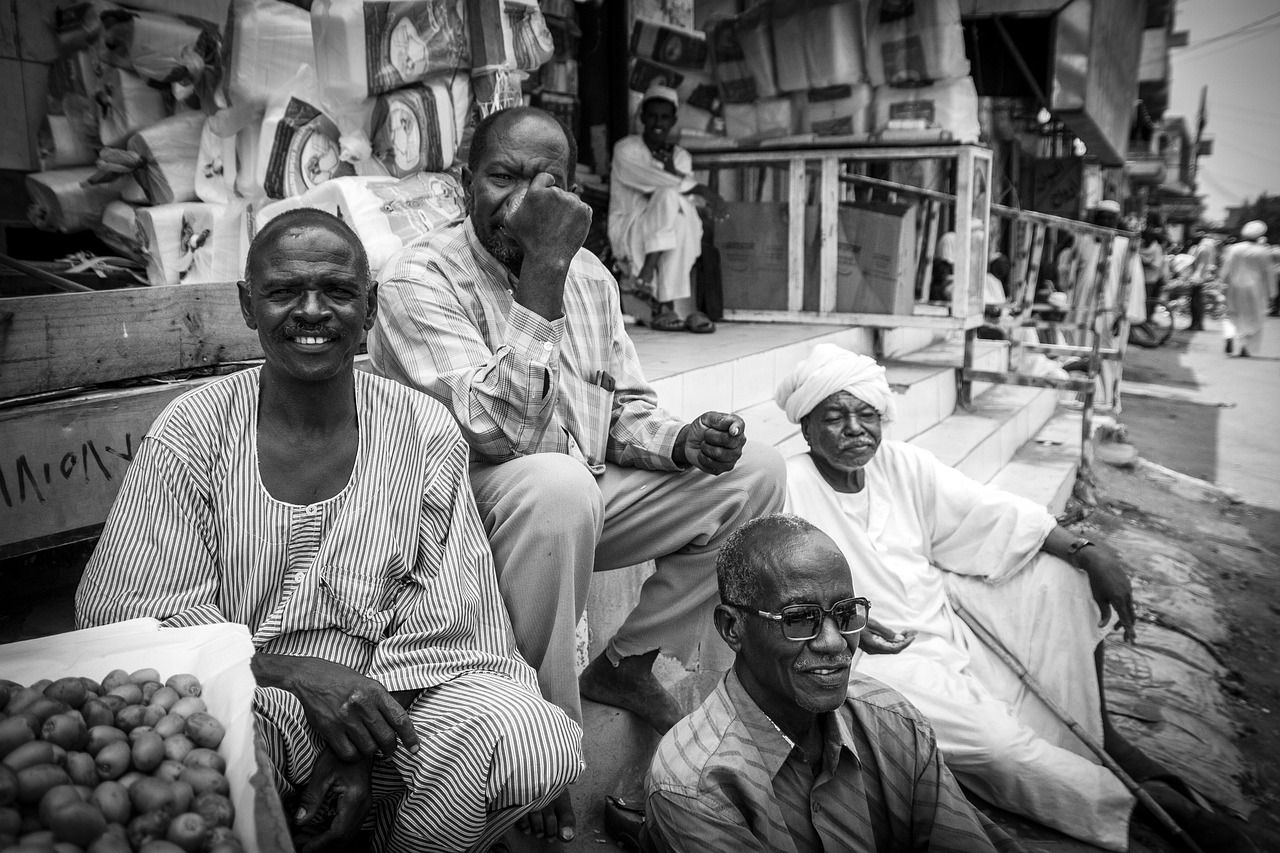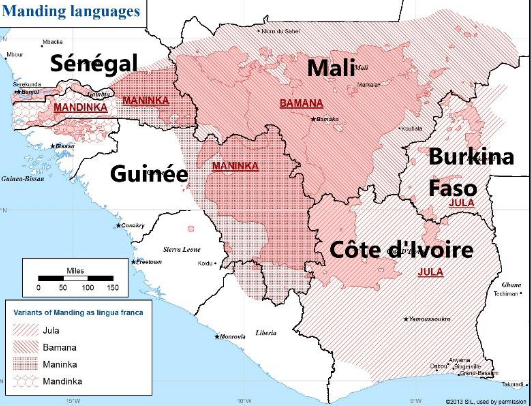
On April 15, 2023, in North Sudan, known as Sudan, a conflict broke out between the regular army and the paramilitary Rapid Support Forces (RSF). The human cost is rising daily and now stands at around 30,000 people killed in the conflict, according to the United Nations, with approximately 11 million inhabitants displaced. This conflict is a civil war between the camp of General Abdel Fattah al-Burhan, head of the army and the country, and that of his second-in-command, Mohamed Hamdan Daglo, known as “Hemedti,” leader of the Rapid Support Forces (RSF). The conflict between these two politicians appears to be the result of a disagreement over the integration of paramilitary forces into the national army. It is therefore a power struggle between two former allies who have become adversaries due to their divergent opinions. The country is thus divided in two, with the Sudanese armed forces controlling the north and east, while the RSF is based in the south and west, close to Khartoum. The clashes are concentrated in Khartoum and Darfur, which are on the front line, but they have also spread to other cities in the north and south. Calls for a ceasefire have multiplied since the start of hostilities. This is not just an interstate military conflict; it has turned into an unprecedented humanitarian crisis.
Approximately 25 million people, or half the population, need humanitarian aid to survive. According to UNICEF, nearly 15 million children require emergency humanitarian aid. In February 2024, the UN agency warned that widespread malnutrition and forced displacement threaten to kill more children than the conflict itself. Since the beginning of this conflict, famine has reached record levels. In fact, the IPC 5 category of famine has been reached, in other words, the highest level on the acute food insecurity scale. The fighting in Sudan has caused “the world’s largest and fastest-growing displacement crisis,” according to the Office of the High Commissioner for Refugees. More than 12 million people have fled their homes, according to the UN, including nearly 3 million who have sought refuge in neighboring countries.
In addition, many local and international actors, such as the United States and Saudi Arabia, are attempting to resolve the crisis by organizing discussions between the army and civilian actors in Sudan. Sudan is also a strategic area due to its borders with seven different states and the conflicting ambitions and interests of international actors. Despite the UN’s efforts, the situation in Sudan remains extremely worrying. Fighting continues, human rights violations are frequent, and humanitarian access is hampered. Increased international mobilization is needed to end the conflict, protect civilians, and respond to urgent humanitarian needs. International news coverage of the conflict in Sudan is very limited. Although it is the second-largest country in Africa, the Western media only pays superficial attention to it.
Two years later, war continues to devastate the country and worsen the living conditions of its inhabitants, who are suffering from an unprecedented famine. In early April 2025, an international meeting was held in London, with most of the European Union in attendance, to reach an agreement on establishing a ceasefire in the country. Indeed, states are realizing the need to act quickly to lift this country out of what the United Nations describes as the world’s most serious humanitarian crisis. Furthermore, the conflict between Burhan and Hemedti has resulted in a major displacement crisis of a speed almost never seen before. The United Nations High Commissioner for Refugees is particularly concerned about the dramatic situation of the people of Sudan who are forced to flee their homes in order to survive. Numerous movements of displacement are taking place within the country itself, but also in the seven countries bordering Sudan. As a result, more than 13 million people, mainly women and children, have fled their homes to another area within the country. Approximately 4 million people have sought refuge in neighboring countries.
The invisibility of the humanitarian crisis in the international media
However, although this humanitarian crisis is one of the most significant of the 21st century, it remains underreported in the international media. Sudan is the only country in the world officially affected by famine, mainly in the state of South Kordofan and the Darfur region. More than half of Sudanese are on the brink of famine, according to the United Nations. This is a humanitarian crisis of the very highest order, but the international media scene pays very little attention to it. It is a war that has been “forgotten” by international public opinion. As a result, it is contributing to the conflict becoming entrenched, threatening the stability of neighboring countries. United Nations aid is therefore essential in order to begin mediation and potentially achieve a ceasefire between the parties. An international conference was organized in Paris, but only a year after the conflict began in Sudan, on April 15, 2023.
This international conference, held on April 15, 2024, aimed to stimulate international mobilization around this “forgotten crisis,” despite its catastrophic humanitarian consequences and significant geopolitical risks. But this civil war, which has led to an unprecedented humanitarian crisis, deserves much more media attention than other conflicts around the world. This is all the more true given that it is closer to the West than we think and has many geopolitical implications. Indeed, this is absolutely necessary in order to “get things moving” in this country, where the outcome seems to be blocked by two warring parties that refuse to capitulate.
Although this conflict represents a geopolitical and strategic issue, its consequences are rarely mentioned in the international media. Instead, attention is focused on the Israeli-Palestinian and Russian-Ukrainian conflicts, which are also manifesting themselves on Sudanese territory. Indeed, Russian mercenaries have had relations with Hemedti’s militants for years. This partnership is a give-and-take arrangement, in other words, the Russian militias are partly financed by Sudanese gold. This has an impact on the Russian-Ukrainian conflict, as Ukraine is trying to attack this source of funding for Russia. Ukraine’s strategic objective in Sudan is to present itself as a state capable of confronting Russia anywhere in the world. This conflict is therefore closer to the West than it might appear at first glance, but it receives much less media coverage than other conflicts around the world. However, this conflict in Sudan between the al-Burhane and Hemedti camps has disastrous consequences for the populations still in Sudanese territory, but also in neighboring countries, where people are fleeing. This is a major humanitarian crisis with geopolitical consequences for neighboring countries and also at the global level, but it is being ignored by the international community and the media.
According to Anglo-Sudanese businessman Mo Ibrahim, the UN Security Council should become more involved in the sub-state conflict in Sudan. He warns of the potentially disastrous consequences of this civil war on territories outside Sudan’s borders. He believes that the United Nations’ inaction in the face of this situation and the lack of significant reaction from international public opinion are only intensifying the humanitarian crisis in Sudan. If the international community continues to take no action to contain this conflict, more and more external actors will become involved in the war.
The proliferation of ambivalent actions by the UN
Since the conflict began on April 15, 2023, numerous calls for a cessation of hostilities have been made. Indeed, on February 14, 2025, UN Secretary-General António Guterres called on rival Sudanese forces to cease hostilities during Ramadan in this country, which has been ravaged since April 2023. The international conference in Paris on April 15, 2024, had both a political aspect, aimed at finding solutions to the conflict, and a humanitarian aspect, aimed at mobilizing mass donations and delivering aid to the country. Furthermore, at the conference on the humanitarian situation in Sudan on February 14, 2025, the UN Secretary-General called for an end to external support and arms flows to Sudan. Indeed, these flows are causing the continuation of considerable destruction and bloodshed for civilians, contributing to the conflict becoming bogged down.
In addition, a UN special envoy to Sudan is carrying out diplomatic actions on the ground, mainly mediation through discussions with the warring parties. He is discussing with the warring parties, Hemedti and al-Burhane, “concrete ways to achieve these objectives, in particular through the full implementation of the Jeddah Declaration” on the protection of civilians. The protection of civilians is a key point in the call for an end to the fighting, which is taking place in many parts of Sudan, creating profound insecurity for the population.
According to Anglo-Sudanese businessman Mo Ibrahim, the UN Security Council must honor its responsibilities, in particular by deploying a force to protect the Sudanese people and adopting a resolution to cut off sources of arms and funding. This can be done in particular through an arms embargo in Darfur, which has been in place for many years. However, there are numerous daily violations, which contribute to the conflict becoming increasingly deadly. The President of the UN Human Rights Council is therefore calling for urgent UN intervention in Sudan: “Given the inability of the warring parties to spare civilians, it is imperative that an independent and impartial force with a mandate to protect civilians be deployed without delay.”
In February 2025, the UN and its humanitarian partners launched a $6 billion appeal to help 26 million people in Sudan and the region in 2025. This aid aims to provide vital assistance, particularly in terms of food, healthcare, and shelter. Indeed, Tom Fletcher, Under-Secretary-General for Humanitarian Affairs, stated that “Sudan is the scene of a humanitarian emergency of appalling proportions.” During 2024, humanitarian organizations managed to help more than 15.6 million Sudanese thanks to $1.8 billion in support. This has made it possible to guarantee access to water, hygiene, healthcare, and shelter as much as possible. In addition, humanitarian organizations in neighboring countries have also provided emergency aid by distributing food to more than one million people and providing medical assistance.
Christopher Lockyear, Secretary General of Médecins Sans Frontières (MSF), addressed the United Nations Security Council on March 13, 2025, calling for an end to violence against civilians in Sudan and a renewed commitment to provide vital aid to the country, which has been ravaged by a devastating civil war for more than two years. In addition, the United Nations denounced serious human rights violations committed by both sides, such as bombings, systematic sexual violence, and massacres of civilians. The UN has therefore promoted human rights by denouncing the crimes committed in Sudan by the warring parties during this civil war. This helps to raise awareness among the international community about the humanitarian crisis that is destroying millions of Sudanese lives.
Limits to UN action to combat the humanitarian crisis
The actions carried out by the United Nations for more than two years have been subject to threats and attacks, which further complicates the smooth delivery of humanitarian aid. In addition, humanitarian efforts are sometimes slowed down or halted by the decision of certain provinces to suspend the operations of certain national and international non-governmental organizations. According to the UN, in May 2025, efforts are being made to reposition food and essential supplies in Darfur before the rains. Unfortunately, these humanitarian efforts may be jeopardized by funding shortfalls, reducing the possibilities for humanitarian aid in Sudan.
In addition, the UN Office for the Coordination of Humanitarian Affairs has stated that humanitarian workers face numerous threats, which further reduces funding. Since the start of the clashes between the warring parties, there has been heavy fighting in towns and rural areas. This constant insecurity makes it extremely difficult for humanitarian aid convoys to reach populations in danger. The warring parties often block the delivery of aid to areas under their control. They also prevent the issuance of visas for humanitarian workers and restrict movement in certain regions. The UN must therefore guarantee the safety of humanitarian workers and the smooth delivery of aid to regions affected by famine and this dramatic humanitarian crisis. NGOs are hampered in their work by the warring parties because of the war crimes committed by both sides. In addition, they fear attempts by the parties to the conflict to infiltrate these NGOs and that information will circulate in the respective camps.
However, despite these threats and difficulties, humanitarian agencies are not giving up on their efforts to help the Sudanese people as much as possible. In a press release dated April 14, 2025, the non-governmental organization Doctors Without Borders (MSF) explains that since the start of the war, they have recorded more than 80 attacks targeting its staff, infrastructure, and supplies. Clinics have been destroyed and robbed, and health workers have been attacked, threatened, or killed. This represents a major threat to humanitarian workers in Sudan, as the warring parties are doing everything they can to prevent humanitarian aid from reaching its destination or being delivered properly. MSF is therefore calling for the complete lifting of humanitarian restrictions and, above all, for guaranteed unhindered access for humanitarian aid. MSF is reiterating its numerous demands to governments and United Nations agencies to facilitate the delivery of humanitarian aid.
This must be done while ensuring that aid reaches the country as quickly as possible, but above all safely. It is essential that humanitarian aid be delivered as quickly and safely as possible to the most isolated communities hardest hit by this unprecedented humanitarian crisis. Indeed, there are many obstacles and security issues that need to be resolved urgently in order to help the Sudanese population survive this humanitarian crisis and civil war. Roads, hospitals, and health centers have been severely affected or are even out of service. Many cities are facing shortages of drinking water and electricity, which complicates the organization of relief efforts for the population. The lack of infrastructure and equipment exacerbates the crisis and complicates the work of humanitarian workers and NGOs on the ground. In addition, another limitation to humanitarian aid in Sudan is the climatic and sanitary conditions, which make it almost impossible to help the population, or at least much more complex.
Furthermore, the fragmentation of local authorities and rivalry between the forces involved complicate the coordination of aid. Indeed, the two sides in the conflict also oppose each other when it comes to delivering humanitarian aid to the population. The absence of a functioning government prevents the establishment of lasting agreements to secure humanitarian corridors. Thus, it is almost impossible to reach an agreement due to this rivalry and the extreme instability in the region.
In June 2024, the United Nations High Commissioner for Refugees (UNHCR), Filippo Grandi, urged “all parties to the conflict to allow humanitarian access” to Sudan, which he considers insufficient, adding that part of the population is at risk of “starving to death.” In fact, all humanitarian aid access is blocked by the two warring parties, making it almost impossible to deliver aid and thus protect and ensure the survival of the population. According to an article by France Inter dated November 20, 2024, there are very few NGOs on the ground, only about fifteen. Humanitarian convoys are regularly blocked by the warring parties, further endangering populations suffering from famine and the consequences of civil war. In addition, United Nations organizations are completely absent from the country, paralyzed by the Security Council, particularly by the Russians, who have vetoed ceasefire proposals.
Thus, there are numerous obstacles to the proper delivery of humanitarian aid, which exacerbates the humanitarian crisis and famine affecting more than half of the Sudanese population. On the one hand, NGOs need to redouble their efforts to deliver humanitarian aid to the country safely. But on the other hand, more action by the UN and the wider international community is essential in order to actively combat this major humanitarian crisis.
Camille H.
Bibliography:
Nations Unies. « Soudan : l’ONU appelle à protéger et à soutenir les civils victimes de la guerre. » ONU Info, 7 févr. 2025, https://news.un.org/fr/story/2025/02/1153096. Consulté le 16 mai 2025.
OCHA. L’ONU appelle à une mobilisation de la communauté internationale pour protéger et soutenir les civils victimes de la guerre au Soudan. 2025, https://www.unocha.org/publications/report/sudan/ lonu-appelle-une-mobilisation-de-la-communaute-internationale-pour-proteger-et-soutenir-les-civils victimes-de-la-guerre-au-soudan. Consulté le 14 mai 2025.
Médecins Sans Frontières. « Guerre au Soudan : l’ONU, MSF dénonce deux ans d’inaction et d’indifférence. » Médecins Sans Frontières Luxembourg, https://msf.lu/articles/guerre-au-soudan-lonu msf-denonce-deux-ans-dinaction-et-dindifference. Consulté le 15 mai 2025.
Médecins Sans Frontières. « Deux ans de guerre au Soudan : la crise humanitaire s’enlise et des millions de personnes sont plus démunies que jamais. » Médecins Sans Frontières, https://www.msf.fr/ communiques-presse/deux-ans-de-guerre-au-soudan-la-crise-humanitaire-s-enlise-et-des-millions-de personnes-sont-plus-demunies-que-jamais. Consulté le 15 mai 2025.
AFP. Mouchent, Nadia. « Soudan : un an de guerre et une crise humanitaire sans précédent. » AFP, 15 avr. 2024.
France Télévisions. Pasquesoone, Valentine. « Comprendre la crise au Soudan, en proie à de violents affrontements. » France Télévisions, 8 mai 2023.
France Inter. « Le Soudan, un désastre humain passé sous les radars. » France Inter, 20 nov. 2024.
Le Monde. « Mo Ibrahim : “L’Afrique doit demander aux Nations unies l’envoi d’une force internationale au Soudan”. » Le Monde, 12 nov. 2024, https://www.lemonde.fr/afrique/article/ 2024/11/12/mo-ibrahim-l-afrique-doit-demander-aux-nations-unies-l-envoi-d-une-force-internationale au-soudan_6390376_3212.html. Consulté le 12 mai 2025.
Le Monde. « Soudan : l’embargo sur les armes au Darfour contourné mais renouvelé par les Nations unies. » Le Monde, 12 sept. 2024, https://www.lemonde.fr/afrique/article/2024/09/12/soudan-l embargo-sur-les-armes-au-darfour-contourne-mais-renouvele-par-les-nations unies_6314763_3212.html. Consulté le 12 mai 2025.
Franceinfo. « Guerre au Soudan : où en est le conflit, deux ans après le début des affrontements ? » Franceinfo, 15 avr. 2025, https://www.francetvinfo.fr/monde/afrique/soudan/guerre-au-soudan-ou-en est-le-conflit-deux-ans-apres-le-debut-des-affrontements_7179990.html. Consulté le 13 mai 2025.
France 24. « Après deux ans de guerre, le Soudan vit “la pire catastrophe humanitaire au monde”. » France 24, 15 avr. 2025, https://www.france24.com/fr/afrique/20250415-après-deux-ans-guerre soudan-pire-catastrophe-humanitaire-au-monde. Consulté le 19 mai 2025.
Guidi, Elie. « Soudan : 5 chiffres qui illustrent l’ampleur de la crise humanitaire qui ravage le pays. » La Croix, 20 juin 2024.
Carbasse, Mathieu. « Au Soudan, la crise oubliée. » 25 nov. 2024.


